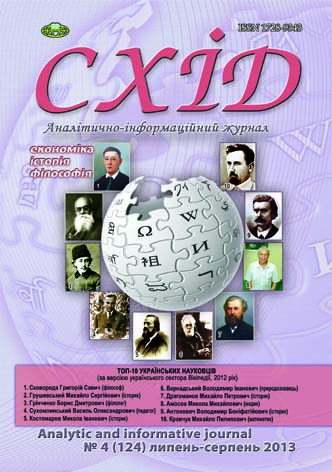Theoretical aspects of solving economic problems of nature management: evolution of scientific views
DOI:
https://doi.org/10.21847/1728-9343.2013.4(124).15846Keywords:
classical school of economics, neoclassical school of economics, theory of property rights, public choice theory, welfare theory, theory of general efficiencyAbstract
In scientific study evolution of the environmental studies in political economy is studied. Classic (Thomas Malthus, David Ricardo, J.S. Mille, G. George, A. Marshall, K. Marx) and neoclassical (A. Pigou, R. Coase, M. Dobby, J. Hershlifer, W. Baumol, W. Outts, T. Titenberh, D. Pearce, K. Turner, etc.). directions of analysis of environmental issues focused on her very dissimilar ecological and economic criteria, often offering and arguing diametrically opposed concepts and methodological revisions. However, the active scientific debate from different schools within economics were generated relatively autonomous fields of scientific opinions that explored a range of issues of contemporary nature: a theory of property rights which explains the root cause of modern ecological and economic crisis; public choice theory, which considers the procedure detection and identification of public including environmental benefits; welfare theory, which puts to allocate scarce natural raw materials, based on the principles of equality and social justice.
Despite the independence of the considered economic theories, approaches to problem solving of ecological of economic processes are closely linked. The transition from the theoretical level to the practical study of the problems of rethinking and links developed in international practice tools to ensure environmental focus economic development of society will create effective management tools restoration of environmental quality and increased efficiency of interaction between society and nature in the processes of production and consumption.
As a result the article developed the idea of scientific views of neoclassical school of economic theory in direction of grounding the importance of priority in the theory of general economic efficiency in the theory of environmental economics in order to create instrumental and methodological tools address the issue of choice of economic alternatives in dealing with international environmental issues and the transformation of domestic natural resources.
Downloads
References
ЛІТЕРАТУРА
Буркинский Б. В. Природопользование: основы экономико-экологической теории / Б. В. Буркинский, В. М. Степанов, С. К. Харичков - Одесса : ИПРЭЭИ НАН Украины, 1999. - 350 с.
Гатаулин К. С. Идеи Римского Клуба: эколого-экономические проблемы и пути их разрешения / К. С. Гатаулин. - Екатеринбург : Издательский Дом, 2001. - 165 с.
Гоуди Дж. Экономическая теория в энвайронментальной науке / Дж. Гоуди ; [пер. с англ. ; под ред. Н. А. Тихонова]. - М. : Русь, 2000. - 276 с.
Попова О. Ю. Генезис економічних концепцій у формуванні економіки навколишнього середовища / О. Ю. Попова // Наукові праці Донецького національного технічного університету. - 2007. - Вип. 31-3. - С. 273-279. - (Сер.: економічна).
Синякевич І. Інструменти екополітики: теорія і практика / І. Синякевич. - Львів : ЗУКЦ, 2003. - 188 с.
Baumol W. J. Economics, environmental policy, and the quality of life / William J. Baumol, Wallace E. Oates, Sue Anne Batey Blackman. - Prentice-Hall, 1979.
Faber M. Ecological Economics. Concept and Methods / M. Faber, R. Manstetten, J. Proops. - Edward Elgar, 1996.
Siebert H. Economics of environmental theory and policy / H. Siebert. - Berlin, 1998. - 187 p.
Wiesmeth H. Environmental Economics: Theory and Policy in Equilibrium / H. Wiestmeth. - Springer, 2012.
REFERENCES
Burkinskiy B., Stepanov V. & Kharichkov S. (1999), Nature management: the basis of economic and ecological theory, Odessa, 350 p. (rus).
Gataulin К. (2001), The ideas of the Club of Rome: environmental and economic problems and their solutions, Yekaterinburg, 165 p. (rus).
Goudi J. (2000), Economic theory in environmental science, Moscow, 276 p. (rus).
Popova O. (2007), Genesis of economic concepts in shaping economic environment, Scientific papers of Donetsk National Technical University, 31-3, pp. 273-279. (ukr).
Syniakevych I. (2003), Environmental policy instruments: Theory and Practice, Lviv, 188 p. (ukr).
William J. Baumol, Wallace E. Oates, Sue Anne Batey Blackman (1979), Economics, environmental policy, and the quality of life, Prentice-Hall (eng).
Faber M., Manstetten R. & Proops J. (1996), Ecological Economics. Concept and Methods, Edward Elgar (eng).
Siebert H. (1998), Economics of environmental theory and policy, Berlin (eng).
Wiesmeth H. (2012), Environmental Economics: Theory and Policy in Equilibrium, Springer (eng).
Downloads
Published
How to Cite
Issue
Section
License
Copyright (c) 2013 Tetiana Koniakhina

This work is licensed under a Creative Commons Attribution-NonCommercial-NoDerivatives 4.0 International License.
1. Authors bear responsibility for the accuracy of facts, quotations, numbers and names used.
2. Manuscripts are not sent back.
3. The publisher does not always agree with the authors' opinion.
4. The authors reserve the right to authorship of the work and pass the first publication right of this work to the journal under the terms of a Creative Commons Attribution-NonCommercial-NoDerivatives 4.0 International License. This license allows others to distribute (copy) the published work for non-commercial purposes, provided there is mandatory attribution to its authors and a link to the first publication in our journal.
5. The authors have the right to conclude separate supplement agreements that relate to non-exclusive work distribution in the form in which it has been published by the journal (for example, to upload the work to the online storage of the journal or publish it as part of a monograph), provided that the reference to the first publication of the work in this journal is included.

